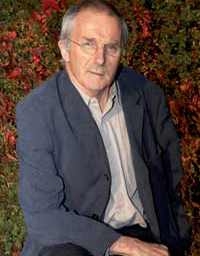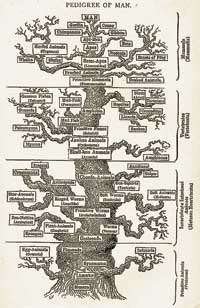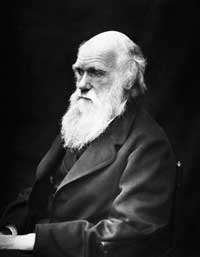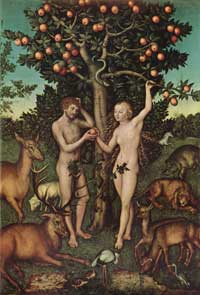Interview with Steve Jones: the threat of creationism Understand article
Steve Jones talks to Vienna Leigh about the startling re-emergence of creationism in Europe, how teachers can help, and why he will never argue with a creationist.

Image courtesy of EMBL Photolab
There’s a worrying trend spreading across Europe. We’re accustomed to hearing about the fiery debate surrounding the teaching of evolution in the USA, especially but not exclusively in the Bible belt. But in November 2006 in an article in Nature, Almut Graebsch and Quirin Schiermeier expressed concern that the teaching of alternative theories in schools is not just an issue across the Atlantic (Graebsch & Schiermeier, 2006).
They’re not the first to notice this. In 2006 the Royal Society, the UK’s national academy of science, launched an attack on creationism, concerned that the idea was gaining a foothold in schools and universities across the country. They enlisted Steve Jones, Professor of Genetics at University College London (UCL), to give his public lecture, ‘Why evolution is right and creationism is wrong’.
Steve, author of several popular books on genetics, including In The Blood and The Language of the Genes, lectures widely about evolution in schools, universities, conferences and research institutes. He’s concerned – and absolutely baffled – by the growing influence of creationist groups in Europe.
“It’s a mystery,” he says. “In the 30 to 40 years I’ve been talking to audiences about evolution, I’d never once had a question about creationism. In the last few years, though, such questions have become completely commonplace.”
Steve estimates that he has lectured more than 100 000 school pupils during his career, and is UCL’s representative at the London Science Learning Centre, which provides in-career training to science teachersw1. He has also featured extensively on BBC radio, presented a six-part TV series and appeared on various other TV programmes, as well as writing for the press on scientific issues, with a regular column in The Daily Telegraph, ‘View from the Lab’.
“It’s very alarming. Graebsch and Schiermeier’s article cites examples of schools in Germany where creationism is being taught and, more notably, Italy, where in 2004 education minister Letizia Moratti caused a furore when she removed the theory of evolution from the curriculum. In Britain, the pro-creationist group Truth in Science sent information packs to every secondary school in the country at the end of 2006. Polish European parliament member Maciej Giertych organised a workshop for parliamentarians entitled ‘Teaching evolution theory in Europe: is your child being indoctrinated in the classroom?’. In October 2007, Miroslaw Orzechowski, Poland’s former deputy education minister, told the newspaper Gazeta Wyborcza: “The theory of evolution is a lie. It is an error we have legalised as a common truth.”

Humanity, from The Evolution of Man,
1910, fifth edition
Public domain image
The creation-evolution debate divides opinion about the origins of life; those who have a faith-based belief trust that life appeared in, as Steve puts it, “some magical, non-scientific means sometime in the fairly recent past”, as opposed to the scientific consensus supporting evolutionary biology. Although many religions have reconciled their beliefs to evolution, there are still many creationists, most prevalent in more conservative regions of the USA, who believe that evolution is contradicted by the stories found in their respective religions. “Creationism is wrong because all its claims fly in the face of everything we know about science,” explains Steve. “But people expect – and fear – too much. They want answers to questions which are not open to scientific enquiry, like ‘is there a God?’, or ‘what does it mean to be human?’.”
The debate isn’t new. Evolutionary ideas such as common descent and the transmutation of species have existed since at least the 6th century BC, but as biological knowledge grew in the 18th century, such ideas developed, challenging the thought that the natural world was fixed by God’s will. It was the publication of English naturalist Charles Darwin’s 1859 book, On the Origin of Species, which established evolution by common descent as the dominant scientific explanation of diversification in nature.
“The Victorians had a horror of evolution at first, thinking it makes us less than human, but in fact it makes us more human – we’re the only animals that have developed art, history, speech – all those things. We are very similar to chimps, but in every way that’s important, we’re completely different,” says Steve.

his later years. Photo by J.
Cameron, 1869
Public domain image; Image source:
Wikimedia Commons
“But by 1870, just over a decade after Darwin’s book came out, the uproar had subsided. Most churchmen were educated people and could see that they could accept evolution and that it had nothing to do with their religious belief. The two things simply don’t clash. Science is far too powerful to bother with ridiculous, untestable theories.”
But why, after 150 years of evolution being recognised as the best explanation for the development of life on Earth, providing a clear understanding of the processes that account for the variety of organisms, and being taught as an essential part of biology and science courses, is pressure from somewhere – maybe simply political correctness – leading even decision-makers to change policies?
“It was the late 1960s when creationism started coming back into fashion, and then was triumphant very gradually. It was mainly as a result of the fear of modern biology, but sometimes because of the false claims of many scientists. But now, I don’t know why it should be so rampant suddenly.”
Of course it’s fair to show both sides of a coin, but to hold up a religion-based theory as an alternative to scientific fact can be damaging.
“I’m not against [teaching creationism at school] as such,” says Steve, “but it should be taught in theology lessons. If you want to go around making ignorant statements, don’t do it in a biology lesson.”
Steve calls creationism ‘anti-science’. “I will never debate with a creationist,” he says. “They think that 2 + 2 = 5; or, at a push, as a compromise, 4.1. I’m entirely sure that 2 + 2 = 4. There’s nothing to discuss. If they won’t accept the physical facts of life, we have nothing to talk about. I don’t care what they believe, unless they’ve got some evidence, which they haven’t.”
“It’s a mystery to me how any scientist can believe in creationism,” he says. “In Europe you don’t get the [same attitudes] about it that you get in the USA, but there is a more sophisticated line of argument; ‘creationism with a college education’. It’s the ‘intelligent design’ argument – that organisms must have been designed by something, because they’re so complex. But Darwin showed that evolution is a factory for making almost impossible things.”
So how can scientists and teachers help? “Teachers feel that evolution isn’t just another part of biology – they think it’s something special, something they have to be careful about. I’m tempted to say they should make evolution boring. They should present it as something that’s simply part of biology, a fact, rather than something that’s debatable and controversial and somehow ‘sexy’.
“Another problem is that evolution is very badly taught, largely because teachers have been taught it badly, and it’s not well-presented in textbooks,” he adds. “The rest of biology is done very well, but when it comes to evolution, it’s very unclear. There are the old, traditional examples – the peppered moth, antibiotic resistance, and Darwin’s finches – but there are no new examples. Teachers aren’t taught what modern evolutionary biology is.
“Darwin didn’t think he would ever see evolution happening – he thought of it as a historical thing, a model that brought together many apparently unrelated facts into one seamless whole – but of course we can see it happening. In the brief history of HIV, we have the perfect example of the whole of the Darwin machine unfolding its powers in front of our eyes. He would have been delighted to see the workings of evolution so starkly exposed.”
A history of creationism
By Dean Madden from the National Centre for Biotechnology Education, University of Reading, UK.
When Darwin was an undergraduate at Cambridge University, UK, his future career was strongly influenced by several scientists, notably geologist Adam Sedgwick and John Henslow, the botanist who suggested that Darwin should accompany Captain FitzRoy on the HMS Beagle. As was required of Cambridge dons at that time, the two scientists were ordained church ministers. They were also deeply committed Christians. Yet even they, some 30 years before Origin of Species was published, doubted the literal truth of the Bible. In England, general acceptance of Darwin’s theory of evolution was rapid, and the Anglican church soon came to terms with it. Elsewhere in Europe and America, religious opposition was muted: typically the debate was not whether natural processes or the Christians’ God had created living things, but whether the creation was a result of a supernatural influence working through nature or the result of natural processes (‘what happened?’ not ‘whodunnit?’).
The Catholic hierarchy has generally been conservative, but the overwhelming weight of evidence was such that in 1996, Pope John Paul II issued a letter in which he said that the work of scientists worldwide: “… leads us to recognise in the theory of evolution more than a hypothesis” (unlike many modern creationists, John Paul understood the difference between a mere hypothesis and a scientific theory). Today, mainstream Christians are not usually biblical literalists, and leaders in both the Catholic and Anglican churches have recently reaffirmed their opposition to the teaching of creationism in science lessons (Thavis, 2006; Bates, 2006).
In August 2006, an analysis of people’s acceptance of evolution was published by the journal Science (Miller, 2006). Thirty-two European nations plus the USA and Japan were compared in the report. The study showed that Icelanders, Danes, Swedes, French, Japanese and Britons were among those most likely to accept that humans evolved “… from earlier species of animals”. Individuals with a strong belief in a personal God and who prayed frequently were significantly less likely to accept the concept of evolution. In the USA and Turkey, where strong religious beliefs are common and evolution education has been politicised, people were least likely to accept evolution.
Throughout the western world, particularly in Europe, secular modernity has long been seen as a consequence of urbanisation, increased wealth and better education. Sociologists have speculated that, as the religious become increasingly conscious of their unusual identity in a secular society, they may become more entrenched in their views. Such entrenchment may also be true of those of no faith, living in predominantly religious societies. This may account for the increasingly polarised debate over the teaching of evolution that has been noted by several observers, including Steve Jones.

the Elder (1472–1553)
Public domain image; image
source: Wikimedia Commons
The emergence of much modern opposition to the teaching of evolution worldwide can be traced back to the pioneering days of the USA, when settlers from different religious backgrounds, unable to rely upon an established church hierarchy, found it necessary to develop their own ‘do it yourself’ churches. This, coupled with a highly decentralised education system, largely run by elected amateurs in 17 000 school districts, has led to several instances where school boards have tried to prevent the teaching of evolution or to promote the teaching of religion. These have often been challenged in the courts.
The most famous remains the Scopes ‘monkey trial’ of 1925, which was held in Dayton, Tennessee, USA. By the mid-1920s, six of the Southern states had already passed anti-evolution laws. The Scopes trial was a publicity stunt concocted by local businessmen to boost Dayton’s flagging economy: the trial would be the first in the USA to be broadcast live on the radio. When he was approached by several businessmen, twenty-four-year-old John Scopes agreed to their request to stand trial. Everyone knew that Scopes was likely to be convicted of teaching evolution, although in reality he may only have used a book that included evolution, and may not have taught the subject. The American Civil Liberties Union (ACLU), which backed Scopes’ defence, planned to appeal to the US Supreme Court in the hope of obtaining a judgement which clarified the rights of the individual over those of the government.
Although Scopes was convicted, the ruling was soon overturned on a technicality, robbing the ACLU of its chance to take the case further. The ban on evolution education remained, and the amount of evolution taught in US schools declined over the next 35 years, so that evolution was absent from almost all US school biology textbooks in the early 1960s. The Sputnik scare of 1957 prompted a re-think of US science education, and evolution returned to the textbooks, notably the new high-school texts produced by the Biological Sciences Curriculum Study. When the Tennessee law and others like it were eventually declared unconstitutional in the 1960s, the anti-evolutionists were forced to adopt a different strategy. This approach was necessitated by the USA’s separation of church and state, which does not permit the teaching of religion as religion in publicly funded schools. Throughout the 1970s and early 1980s, ‘creation science’ was their preferred mechanism.
‘Creation science’ attempted to suggest that scientific evidence supported biblical events, and demanded that equal time be given to creationism and evolution in the classroom. Most of the highly selective interpretations of evidence were obvious nonsense. For instance, it was suggested that humans initially escaped the biblical flood by climbing to the tops of mountains. Dinosaurs, however, were less successful and trilobites even less so – this accounted for the relative positions of fossils in rock strata. Several court judgements, notably in Arkansas and Louisiana, ruled out the ‘equal time’ argument. Creationism was deemed a religious idea by the US Supreme Court, not a scientific one, and therefore it could not be taught in US schools.
Recently, the plain creationism of Scopes’s time and ‘creation science’ of the late 20th century have been replaced by ‘intelligent design’ (ID), a strategy promoted by the US Discovery Institute, which aims to “… replace materialistic explanations with the theistic understanding that nature and human beings are created by God”.
The ID movement generally avoids any reference to a God however, and presents its ideas as rational alternatives to accepted scientific understanding, which should therefore be entitled to equal treatment in (US) science classrooms. Consequently, ‘Teach the controversy’ became the new slogan of the anti-evolutionists.
Perhaps because of its appeal to fairness and its superficially scientific approach, unlike that of similar efforts in the past, the ID movement’s influence has been felt far beyond its native USA. Well-organised, often generously funded and sometimes politically endorsed campaigns have influenced school education not only in countries such as Poland and Turkey, where religion and politics are closely associated, but also in more secular societies including France, Germany and Italy. Early in 2004, for example, Italy witnessed the removal of the theory of evolution from the middle-school curriculum, ostensibly because students ‘were confused by it’. Almost two years later, after a ‘Darwin Commission’ had reported, a weakened account of evolution was re-introduced, omitting any reference to human origins.
This and similar events, such as the Dover School Board trial in the USA, led the Interacademy Panel on International Issues, a global network of the world’s science adcademies, to issue a statement on the teaching of evolution in June 2006w2. “Theories about the origin and evolution of life on Earth…”, it said, were being “…confused with theories not testable by science”. It noted that all forms of life on Earth continue to evolve, a fact which “…palaeontology and the modern biological and biochemical sciences are describing and independently confirming with increasing precision. Commonalities in the structure of the genetic code of all organisms living today, including humans, clearly indicate their common primordial origin”. Similarly, the Council of Europe has issued a strongly worded statement in support of teaching evolutionw3.
What will the next challenge from the creationists be? In Louisiana, USA, groups hostile to evolution have adopted a subtle new tactic, which appears to encourage a cherished feature of science. They have proposed and passed a law which requires ‘academic freedom’ to promote “… critical thinking skills, logical analysis, and open and objective discussion of scientific theories being studied, including, but not limited to, evolution, the origins of life, global warming and human cloning”. Critics fear that this law and others will allow creationism in by the back door.
References
- Bates S (2006) Archbishop: stop teaching creationism. Williams backs science over Bible. Education Guardian, 21 March. www.guardian.co.uk/uk/2006/mar/21/religion.topstories3
- Graebsch A, Schiermeier Q (2006) Anti-evolutionists raise their profile in Europe. Nature 444: 406-407. doi:10.1038/444406a. Download the article free of charge here or subscribe to Nature today: www.nature.com/subscribe
- Miller JD, Scott EC, Okamoto S (2006) Public acceptance of evolution. Science 313: 765–766. doi:10.1126/science.1126746. Supporting online material: www.sciencemag.org/cgi/content/full/313/5788/765/DC1
- Thavis J (2006) Intelligent design not science, says Vatican newspaper article. Catholic News Service, 17 January. www.catholicnews.com/data/stories/cns/0600273.htm
Web References
- w1 – For more information about the Science Learning Centre network and the courses they offer for UK-based teachers, see: www.sciencelearningcentres.org.uk
- w2 – In 2006, 67 members of the InterAcademy Panel on International Issues, a network of science academies from around the world, issued a joint statement ‘On the Teaching of Evolution’. See: www.interacademies.net/CMS/About/3143.aspx
- w3 – The Council of Europe has issued a statement entitled ‘The dangers of creationism in education’. See: http://assembly.coe.int/Main.asp?link=/Documents/AdoptedText/ta07/ERES1580.htm
Resources
- The UK Department for Children, Schools and Families (formerly the Department for Education and Skills) provides guidance on the place of creationism and intelligent design in science lessons. See: www.teachernet.gov.uk/docbank/index.cfm?id=11890
- The Big Picture is a free magazine-style publication from the Wellcome Trust for post-16 students and their teachers. The Big Picture on evolution is available to download (as a PDF document) or to read on screen and is supported by additional resources for teachers. See: www.wellcome.ac.uk/Professional-resources/Education-resources/Big-Picture/Evolution/index.htm
- The Understanding Evolution website from the University of California, Berkeley (USA), provides authoritative, up-to-date information about evolutionary mechanisms, theory, evidence and modern research. The site includes numerous resources for teaching about evolution (aimed at a US audience). See: http://evolution.berkeley.edu
- For an open-access article about the status of evolution and creationism in US schools, see:
- Berkman MB, Pacheco JS, Plutzer E (2008) Evolution and creationism in America’s classrooms: a national portrait. PLoS Biology 6(5): e124. doi:10.1371/journal.pbio.0060124
- The 2005 Eurobarometer survey examined European attitudes to science and technology. In particular, see Section 3.3, ‘Science, Faith and Luck’:
- European Commission (2005) Special Eurobarometer 224: Europeans, science and technology. http://ec.europa.eu/public_opinion/archives/ebs/ebs_224_report_en.pdf
- A popular, readable and up-to-date account of evolution is:
- Jones S (2001) Almost like a whale: The Origin of Species updated. London, UK: Black Swan. ISBN: 055299958X
- Some other recent popular books are:
- Carroll SB (2008) The making of the fittest: DNA and the ultimate forensic record of evolution. London, UK: Quercus. ISBN: 9781847244765
- Shubin N (2008) Your inner fish. A journey into the 3.5 billion-year history of the human body. London, UK: Allen Lane. ISBN: 9780713999358
- For a review of a book describing the development of Charles Darwin’s The Origin of Species and its wider impact, see:
- Madden D (2007) Darwin’s The Origin of Species. Science in School 7: 67. www.scienceinschool.org/2007/issue7/Darwin
Review
One of the most important (and for some, the most controversial) scientific discoveries of all time was unveiled to the public 150 years ago next year. The seminal text, On the Origin of Species by Means of Natural Selection, was published in 1859, and its author, Charles Darwin, would be celebrating his 200th birthday next year. Plans are advanced for celebrations around the world to mark Darwin 200. The celebrations have already begun, as 1 July 2008 marked the 150th anniversary of Darwin and Wallace announcing their theory.
Steve Jones is one of the best-known of modern geneticists, both through his academic achievements and his popularity as a communicator of science. In this article he confirms his acceptance of the Darwinian theory of evolution, and also presents some of his arguments against creationism.
Perhaps this thought-provoking article will re-open a debate for some readers; for others it may inspire them to re-appraise the scientific method in contrast with anti-science.
The article could be used in biology (while teaching evolution), theology or religious studies (in a consideration of creationism) or in English lessons (as the basis of a debate or comprehension exercise).
Marie Walsh, Republic of Ireland





